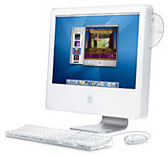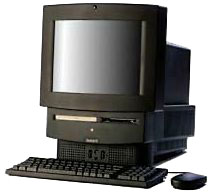Mac Musings
October One of Apple's Favorite Months for New Products: What Next?
Daniel Knight - 2004.10.18
As Mac watchers know, Apple has a times of year when they are more likely to introduce new computers.
January 1984: The original Macintosh. 1986: Mac Plus. And in more recent years, the January Macworld Expo has been a common launching pad for new Macs.
July, the month of the summer Macworld Expo, has also been popular, as have April and October.
That's right, October. This month. Far enough ahead of the holidays for families to budget and kids to put them on the Christmas list.
- 1990.10.15: Mac Classic, LC, and IIsi introduced.
- 1991.10.21: PowerBook 100, 140, and 170. Mac Classic II. Quadra 700 and 900.
- 1992.10.19: PowerBook 160 and 180. Mac IIvx and IIvi.
- 1992.10.21: Quadra 605, 610, 650, and 800.
- 1993.10.18: LC II+, Performa 475.
- 1993.10.25: Macintosh TV.
- 1993.10.31: Colour Classic II.
- 1994.10.18: Performa 550.
- 1996.10.01: PowerBook 1400.
- 1998.10.31: iMac 333.
- 1999.10.05: Slot-loading iMacs.
- 2001.10.16: 600 MHz iBook. PowerBook G4 reaches 667 MHz.
- 2001.10.23: iPod introduced.
- 2003.10.22: iBook G4.
Look at the pattern. Almost every year since 1990, Apple has introduced new Macs in October. The month's over half finished, and I suspect we may see some new products from Apple this week or next. (Apple seems to prefer Tuesday for product introductions in recent years, so maybe tomorrow.)
What can we expect from Apple?
New iMacs, Power Macs, or PowerBooks are unlikely. iBooks are nearly as fast as PowerBooks, so don't expect a change there.
 The eMac has been at 1.25 GHz since
April, and bumping that to 1.33 GHz or 1.5 GHz could spur
additional sales of Apple's only sub-$1,000 computer. Or maybe a
brand new flat-panel eMac with the same basic design as the G5
iMac, but using a G4 processor and either a 15" 1280 x 854 or 17"
1440 x 900 display.
The eMac has been at 1.25 GHz since
April, and bumping that to 1.33 GHz or 1.5 GHz could spur
additional sales of Apple's only sub-$1,000 computer. Or maybe a
brand new flat-panel eMac with the same basic design as the G5
iMac, but using a G4 processor and either a 15" 1280 x 854 or 17"
1440 x 900 display.
Is that likely to happen? If IBM were able to make G5 processors as quickly as Apple needs them, I'd say it would be unlikely until January, but with G5 CPUs constrained, the possibility of a flat-panel eMac is greatly increased. I'm not holding my breath, but it wouldn't surprise me either.
October seems to be the month for primarily consumer hardware, not the high-end pro gear. In light of that, maybe Apple will borrow a page from it's history and introduce a low-end modular Mac. That's far less likely than a flat-panel or speed-bumped eMac, and there's no indication Apple will ever attempt to offer the kind of low-cost modular machine that attracts so many Windows users.
I think expecting a 60 GB iPod is a no-brainer. Toshiba has the drives; all Apple has to do is drop them into the existing iPod design.
Or they could take it a step further. Rumor has it that Apple may go with a color display in the next iPod, which would also make it great for storing and viewing digital photos.
What else could Apple do? Well, I still think a true digital hub makes a lot of sense - a computer that can act as a family file server, firewall, AirPort Extreme hub, music server, and digital video recorder.
 It's the product I'd make if I ran Apple, but
then again Steve Jobs seems to be very biased against any TV-on-the-Mac solution. Odd for a man
whose other business makes so much money creating animated features
that will be watched on TV sets - and odd for the company that has
done so much to make working with digital video easy.
It's the product I'd make if I ran Apple, but
then again Steve Jobs seems to be very biased against any TV-on-the-Mac solution. Odd for a man
whose other business makes so much money creating animated features
that will be watched on TV sets - and odd for the company that has
done so much to make working with digital video easy.
I don't see how the company that makes iMovie, iDVD, Final Cut, and other software for that market so deliberately turns its back to the fact that most people - Mac users included - not only watch TV, but even record programs for later viewing.
Or Apple could go into the moribund PDA market with a Newton for the 21st century. Bigger than a Palm or PocketPC. Fantastic character recognition. The same kind of microdrive found in the iPod. A really decent 800 x 600 display. Great battery life. Apple's famed ease of use and the stability of OS X.
Just imagine the switcher campaign taking on Palms and PocketPCs with their minimal amounts of memory, oddball CPUs, and general inability to run the same software as desktop PCs.
Offer a Bluetooth keyboard and mouse. Let it take the AirPort Extreme card. Give it a button that will put it into FireWire Drive Mode. Make it a great way for Mac users to transport their files as well as a great PDA for when you need to work with a handheld in the field.
Again, unlikely. Apple abandoned that market long ago.
On the other hand, they took the geeky market for MP3 players, created the iPod, and made portable, high-capacity music players one of the hottest markets we know today.
Why not do the same for PDAs or digital video recorders?